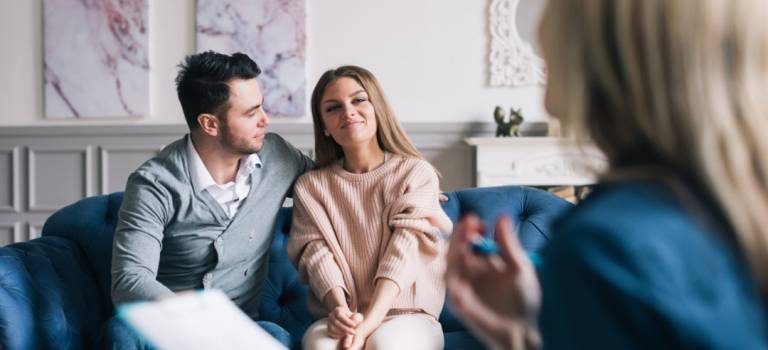What To Expect From Marriage Counselling?
Marriage counselling or relationship counselling is a journey often embarked upon by couples seeking to heal, strengthen, or evaluate their relationships. It is a multifaceted process.
This article delves into what couples can expect from couples counselling, and the various techniques and tools therapists use. It explores the pivotal question: Can my marriage be saved, and when is it too late?
What to Expect in Marriage Counselling?

Couples counselling is a type of therapy that helps partners of all types recognize and resolve conflicts and improve their relationship.
It can be short-term or long-term and range from a few sessions to several months or years, depending on the depth of the issues.
What happens in Relationship Counselling?
Initial Assessment
Marriage counselling usually begins with an Initial Assessment where the therapist takes the time to understand the history and dynamics of the relationship. This stage involves delving into how the couple met, their dating history, and the evolution of their relationship over time.
It’s also an opportunity for the therapist to identify the primary issues affecting the couple, including recent conflicts or long-standing disagreements. This phase is crucial for establishing a therapeutic relationship and building trust and rapport between the therapist and the couple.
Goal Setting
Following the initial assessment, the process moves into Goal Setting. This collaborative effort involves the couple and the therapist working together to set specific and achievable goals.
These goals are tailored to the couple’s unique needs and can range from immediate objectives like improving daily communication to long-term aspirations such as rebuilding trust.
This stage ensures that the therapy addresses the most relevant and pressing issues in the relationship.
Communication Enhancement
A significant focus of marriage counselling is on Communication Enhancement.
Relationship counsellors introduce the couple to practical communication skills, such as active listening, assertive speaking, and understanding nonverbal cues.
Couples practice these skills during sessions, receiving feedback and guidance to improve their interaction. This stage is vital for breaking down communication barriers and fostering a deeper understanding and empathy between partners.
Conflict Resolution
Conflict Resolution is another critical aspect of the therapy. The therapist assists the couple in recognizing and altering unproductive conflict patterns.
Couples learn healthy strategies for resolving disagreements, focusing on constructive problem-solving and negotiation.
Relationship therapy sessions may include learning techniques to prevent conflicts from escalating, such as timeouts and identifying triggers.
Emotional Processing
Finally, marriage counselling provides a safe environment for Emotional Processing. In this stage, each partner can express their feelings, fears, and desires openly.
The therapist guides the couple in exploring the emotions underlying their conflicts and disagreements, helping to build empathy and understanding. This process allows partners to see each other’s perspectives more clearly and can lead to deeper emotional connections.
Through these stages, couples counselling aims to equip couples with the necessary tools and insights to strengthen their relationship and navigate their challenges more effectively.
Techniques and Tools Used in Marriage Counseling

The effectiveness of relationship counselling largely depends on the techniques and tools the therapist uses. Another significant influence is both partner’s willingness to make the relationship work.
Some of the most commonly employed methods include (these tools and strategies may differ between marriage and relationships counsellors):
Cognitive-behavioural therapy (CBT) in Marriage Counseling
Cognitive-behavioural therapy, commonly known as CBT, is a widely used approach in marriage counselling that focuses on identifying and changing negative thought patterns and behaviours that negatively impact the marriage. This method operates on the principle that negative thoughts and behaviours are interconnected, and by altering these, couples can experience a positive change in their emotional state and interactions.
CBT helps couples recognize and challenge unhelpful thoughts, learn practical problem-solving skills, and develop healthier communication patterns.
The Gottman Method in Strengthening Relationships
Renowned psychologist Drs developed the Gottman Method. John and Julie Gottman is a research-based approach to improving relationships. This method utilizes specific interventions and exercises based on years of observational studies. It is designed to help couples increase respect, affection, and closeness, manage conflict more effectively, and share their life purpose and dreams.
The Gottman Method is particularly noted for its emphasis on building what Dr. John Gottman calls “The Sound Relationship House,” which includes components like trust, commitment, and conflict management.
Ellen Wachtel’s Strength-Based Approach in Marriage Counselling

Ellen Wachtel’s approach in marriage counselling emphasizes focusing on the positive aspects of a relationship and fostering self-reflection over blame. This strength-based method encourages couples to identify and build upon what works well in their relationship rather than fixating on problems or assigning fault.
Key aspects include recognizing and reinforcing each partner’s strengths, increasing positive interactions, and promoting personal growth through introspection. This approach aims to create a more optimistic and appreciative dynamic within the partnership.
Emotionally Focused Therapy (EFT) for Emotional Bonds
Emotionally focused therapy, or EFT, is a therapeutic approach to strengthening the emotional bonds between partners. This method is based on the science of attachment, which suggests that emotionally fulfilling relationships are integral to mental and physical health. EFT helps couples understand and respond more effectively to each other’s emotional needs.
The primary focus of EFT is to establish a more secure emotional attachment and increase trust and security in the relationship.
Narrative Therapy: Rewriting Relationship Stories
Narrative Therapy is a unique approach in marriage counselling that encourages couples to rewrite their negative and unhelpful narratives about their relationship and each other. This technique views problems as separate from people and assumes that individuals have many skills, beliefs, and abilities that will assist them in changing their relationship narratives.
Couples are encouraged to explore their values and identify the skills and knowledge they possess to overcome relational challenges, thereby rewriting their story more empoweringly and cohesively.
Communication Techniques: The Core of Healthy Interaction
Effective communication techniques are fundamental to successful marriage counselling. These include skills such as active listening, which involves fully concentrating, understanding, and responding to what is being said.
Assertive communication is also encouraged, allowing individuals to express themselves openly and honestly while respecting the other person.
Another vital technique is using “I” statements, which helps reduce blame and express feelings without creating defensiveness. These communication skills are crucial in fostering understanding, empathy, and respect in the relationship.
Psychodynamic Couple’s Therapy Overview
Psychodynamic couple’s therapy explores the more profound, often unconscious motivations, hopes, and fears influencing relationship dynamics.
It aims to uncover each partner’s underlying emotional drivers, often rooted in past experiences and childhood, to enhance understanding and empathy within the relationship.
This approach helps couples address surface conflicts and the deeper emotional issues contributing to these conflicts, leading to more profound and empathetic connections.
Behavioral Couples Therapy (BCT)
Behavioural therapy, also known as Behavioral Couples Therapy (BCT), focuses on shaping behaviour within a relationship to enhance stability and satisfaction.
The core principle of BCT is to reinforce positive behaviours that contribute to a healthier, more fulfilling partnership. Simultaneously, it involves identifying and discouraging behaviours that promote negativity or discord.
By actively encouraging actions that bring about positive interactions and dissuading those that lead to conflict or unhappiness, BCT aims to create a more harmonious and supportive dynamic between partners. The therapy often includes setting specific goals and using techniques like positive reinforcement to achieve them, fostering a more nurturing and positive relationship environment.
Can A Marriage Be Saved With Marriage Counselling?

The question of whether a marriage can be saved hinges on several factors:
- Willingness to Change: Both partners must be willing to work on themselves and the relationship.
- Underlying Issues: Some issues, like abuse or severe mental health problems, may be more challenging to address.
- Commitment to the Process: Successful therapy requires time, effort, and patience from both partners.
- Quality of the Relationship: The overall history and quality of the relationship play a crucial role in its potential for recovery.
Recognizing When It May Be Too Late

While many marriages can be salvaged with hard work and dedication, there are situations where it might be too late:
- Chronic Disrespect or Abuse: Continuous disrespect and emotional or physical abuse are strong indicators that the relationship may be irreparable.
- Lack of Willingness to Participate: If one or both partners are unwilling to engage in the therapy process, the chances of success are significantly diminished.
- Repeated Infidelity: While some couples overcome infidelity, repeated betrayals often erode the foundation of trust to a breaking point.
- Detachment: If one or both partners are emotionally detached and are unwilling to reconnect, saving the marriage becomes increasingly tricky.
Relationship counselling is a complex, deeply personal process that can lead to profound changes in a relationship.
While there is no universal answer to whether a marriage can be saved, the journey through counselling often provides the clarity and understanding needed to make the best decision for both partners.
The key lies in the willingness to try, the commitment to change, and the courage to face whatever outcome emerges.
For those ready to take this significant step, we encourage you to reach out to Lee Calleja, our Southport Marriage Counsellor at Chirn Park Health Group, where a journey towards healing and understanding awaits you.









